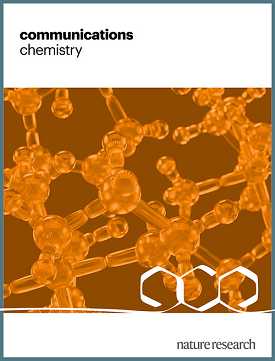Discovering covalent cyclic peptide inhibitors of peptidyl arginine deiminase 4 (PADI4) using mRNA-display with a genetically encoded electrophilic warhead
IF 5.9
2区 化学
Q1 CHEMISTRY, MULTIDISCIPLINARY
引用次数: 0
Abstract
Covalent drugs can achieve high potency with long dosing intervals. However, concerns remain about side-effects associated with off-target reactivity. Combining macrocyclic peptides with covalent warheads provides a solution to minimise off-target reactivity: the peptide enables highly specific target binding, positioning a weakly reactive warhead proximal to a suitable residue in the target. Here we demonstrate the direct discovery of covalent cyclic peptides using encoded libraries containing a weakly electrophilic cysteine-reactive fluoroamidine warhead. We combine direct incorporation of the warhead into peptide libraries using the flexible in vitro translation system with a peptide selection approach that identifies only covalent target binders. Using this approach, we identify potent and selective covalent inhibitors of the peptidyl arginine deiminase, PADI4 or PAD4, that react exclusively at the active site cysteine. We envisage this approach will enable covalent peptide inhibitor discovery for a range of related enzymes and expansion to alternative warheads in the future. Covalent peptide drugs can achieve high potency and selectivity with long dosing intervals, however, methods to discover them are limited. Here, the authors incorporate a genetically encoded, weakly electrophilic cysteine-reactive fluoroamidine warhead into mRNA display libraries and screen these to discover potent and selective covalent cyclic peptide inhibitors of peptidyl arginine deiminase 4.

利用基因编码亲电战斗部mrna展示发现肽基精氨酸脱亚胺酶4 (PADI4)共价环肽抑制剂
共价药物可以在较长的给药间隔中获得较高的效力。然而,人们仍然担心与脱靶反应相关的副作用。将大环肽与共价战斗部结合提供了一种最小化脱靶反应性的解决方案:肽可以实现高度特异性的靶标结合,将反应性弱的战斗部定位在靶标中合适的残基附近。在这里,我们证明了使用含有弱亲电半胱氨酸反应性氟脒战斗部的编码文库直接发现共价环肽。我们使用灵活的体外翻译系统将弹头直接整合到肽库中,并采用仅识别共价靶结合物的肽选择方法。使用这种方法,我们确定了有效的和选择性的肽基精氨酸脱亚胺酶的共价抑制剂PADI4或PAD4,它们只在活性位点半胱氨酸上反应。我们设想这种方法将使共价肽抑制剂的一系列相关酶的发现和扩展到替代弹头在未来。共价肽类药物可以在较长的给药间隔内获得较高的效价和选择性,但发现它们的方法有限。在这里,作者将基因编码的弱亲电半胱氨酸反应型氟脒战斗部纳入mRNA展示文库,并对这些文库进行筛选,以发现有效的、选择性的肽基精氨酸脱亚胺酶4共价环肽抑制剂。
本文章由计算机程序翻译,如有差异,请以英文原文为准。
求助全文
约1分钟内获得全文
求助全文
来源期刊

Communications Chemistry
Chemistry-General Chemistry
CiteScore
7.70
自引率
1.70%
发文量
146
审稿时长
13 weeks
期刊介绍:
Communications Chemistry is an open access journal from Nature Research publishing high-quality research, reviews and commentary in all areas of the chemical sciences. Research papers published by the journal represent significant advances bringing new chemical insight to a specialized area of research. We also aim to provide a community forum for issues of importance to all chemists, regardless of sub-discipline.
 求助内容:
求助内容: 应助结果提醒方式:
应助结果提醒方式:


